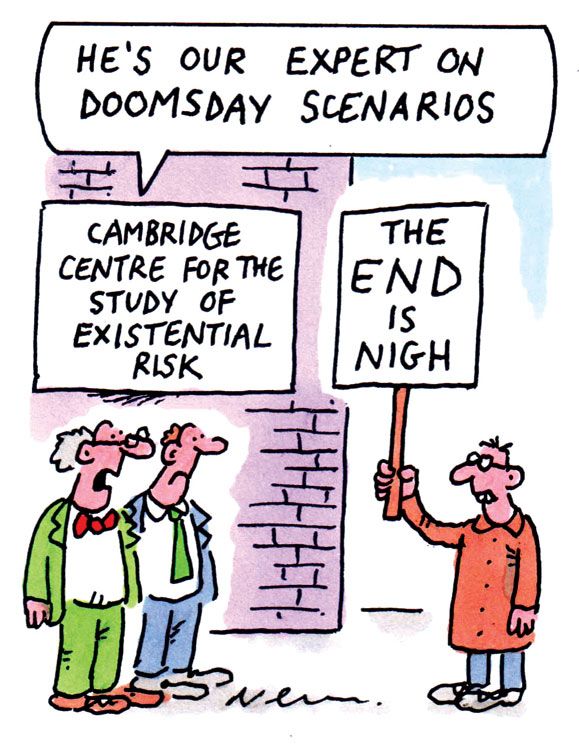
- An unlikely bunch of larger-than-life characters have come together to save the Earth from destruction. No, it’s not the plot for the new Marvel superheroes blockbuster but a task force put together by Lord Rees of Ludlow, the Astronomer Royal, to conduct research into what to do in the event of disasters that threaten the entire human race, The Independent reported on 13 September. Presently a loose coalition of scholars, the Cambridge Centre for the Study of Existential Risk hopes to announce major funding and more research into various “doomsday” scenarios. Despite a distinct lack of special powers, Lord Rees’ team is stellar, with fellow cosmologist Stephen Hawking, Huw Price (Bertrand Russell professor of philosophy at the University of Cambridge) and Skype co-founder Jaan Tallinn on board. Among the “low probability but catastrophic” disasters under consideration are bioterrorist attacks, food shortages and fast-moving pandemics. There is no word yet on Hollywood’s favourite plot: alien invasion.
- Almost £18,000 was spent on a farewell party for former University College London provost Sir Malcolm Grant, London Student reported on 16 September. About £2,000 went on 880 bottles of sparkling wine for the send-off on 19 June, although “pictures suggest the bottles far outnumbered the guests”, the paper observed. Another £260 was spent on 200 moustache-shaped cookies in honour of Sir Malcolm’s famous facial hair, with the overall biscuit spend totalling £563, according to figures obtained via a Freedom of Information request. The Abba tribute band Björn Again was paid £8,225 to entertain guests (though a private donor contributed £3,500). UCL students’ union officer Hannah Webb called the expenditure “ludicrous”, especially when cleaners “are still not being paid a living wage”. UCL said that all staff were invited to the event and that spending on food and drink equated to “less than £5 a head”.
- Queen’s University Belfast has waived a fine of more than £8,500 after a professor returned a library book that was 47 years overdue, The Independent reported on 16 September. John “Jack” Foster, emeritus professor at Queen’s Institute of Irish Studies, found the book by Victorian poet Arthur Hugh Clough when he returned to Vancouver to clear out his locker at the University of British Columbia, where he had been teaching for several years. With a due date stamp of 11 October 1966 and charges of 50p per day, the Queen’s alumnus was pleased that the university agreed to write off the £8,577.50 fine. “I suppose the moral of the story if you discover an overdue book is make sure it’s really, really overdue before you think about returning it,” Professor Foster said.
- A postgraduate at the University of Lagos has claimed that his observations of magnets provide proof that homosexuality is unnatural. In a lengthy interview with Nigeria’s This Day Live website, chemical engineering student Chibuihem Amalaha said he made the “scientific breakthrough” after noticing that poles of magnets repel those of the same type. It “means that man cannot attract another man because they are the same…That is how I used physics to prove gay marriage [is] wrong,” he said. Mr Amalaha then turned to biology to confirm his theory. Cockerels tend to mate with hens, not other roosters, he noted, so QED. His work has apparently been lauded by his supervisors; he says they have told him that he may one day win a Nobel prize. Such claims and their “uncritical and uninformed” reporting are “likely to add to the ignorance and prejudice surrounding homosexuality in Nigeria”, Luiz DeBarros, of South African LGBT website Mambaonline, told Pink News on 16 September.
- The University of South Wales has been criticised for filming a promotional video over the border in Somerset, The Daily Telegraph reported on 17 September. In the 90-second film, actor Ioan Gruffudd, star of Fantastic Four and King Arthur, gives a speech as he strides across the Mendip Hills, rather than the Brecon Beacons near to USW’s Treforest campus, the paper said. “It seems odd the university would choose a well-known Welsh actor to front their ad campaign but made it in England,” said Lindsay Whittle, a Plaid Cymru Welsh Assembly member. A university spokesman said filming had taken place in Somerset to avoid “typically Welsh rainy weather”.
Register to continue
Why register?
- Registration is free and only takes a moment
- Once registered, you can read 3 articles a month
- Sign up for our newsletter
Subscribe
Or subscribe for unlimited access to:
- Unlimited access to news, views, insights & reviews
- Digital editions
- Digital access to THE’s university and college rankings analysis
Already registered or a current subscriber? Login